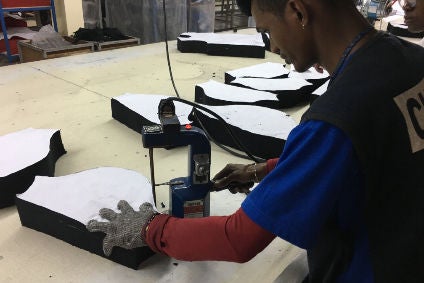
The African Growth and Opportunity Act (AGOA) does not expire for another five years, but calls for its renewal – along with a higher third-country fabric provision cap – are now being made.
The free trade agreement currently runs until 30 September 2025, but a group representing US retailers, brands and importers says the coronavirus crisis and upcoming trade negotiations between the US and Kenya mean “continued certainty in this region is critical now more than ever.”
In a letter sent last week to members of Congress, Steve Lamar, president and CEO of the American Apparel & Footwear Association (AAFA), says: “Even though the AGOA expiration date is five years away, US investment in the region already faces mounting uncertainty.
“Companies are poised to diversify out of China, and Africa is a logical place for many of them. The on-again, off-again nature of the programme before the ten-year renewal was extremely disruptive and meant the industry was not able to take full advantage of the first 15 years of the programme.
“If AGOA were to be renewed this year for another 10 years, companies would have the necessary certainty and timeframe they need to grow a vertical, responsible, and competitive industry in Africa up to and past 2025.”
Launched in 2000, AGOA provides duty-free treatment to US imports of certain products from eligible sub-Saharan African (SSA) countries. The pact was extended for a further ten years by the Obama administration in June 2015. In 2018, US apparel imports from the AGOA region totalled US$1,237m – of which around 98% claimed the AGOA benefits.

US Tariffs are shifting - will you react or anticipate?
Don’t let policy changes catch you off guard. Stay proactive with real-time data and expert analysis.
By GlobalData“As more companies are beginning to utilise AGOA, and specifically the third-country fabric provision, the quota fill rate will be significantly increasing in the coming years,” the letter says. “Therefore, we also suggest raising the existing 3.5% [third-country fabric provision] limit to at least 4.5% [of all apparel articles imported into the United States in the preceding 12-month period], with a growth provision, so that it not be a constraint going forward.”
AAFA also says it sees AGOA as a bridge to other free trade agreements such as the US-Kenya trade deal currently being negotiated – and calls for the talks to ensure Kenya can still draw upon the benefits from other AGOA countries especially for the apparel and footwear industry.
“As we grapple with a “new normal” due to the Covid-19 pandemic, I ask that you renew this important programme this year for another 10 years and that we increase the quota so that we can reinject predictability to support investment well ahead of the current 2025 expiration,” Lamar concludes.
40 African countries are beneficiaries of AGOA – with 26 enjoying duty-free garment exports to the US: Angola, Benin, Botswana, Burkina Faso, Cape Verde, Chad, Eswatini (formerly Swaziland), Ethiopia, Ghana, Ivory Coast, Kenya, Lesotho, Liberia, Madagascar, Malawi, Mauritius, Mozambique, Namibia, Nigeria, Senegal, Sierra Leone, South Africa, Tanzania, Togo, Uganda and Zambia.
See also: US-Kenya trade deal – Here’s what the apparel industry wants.




